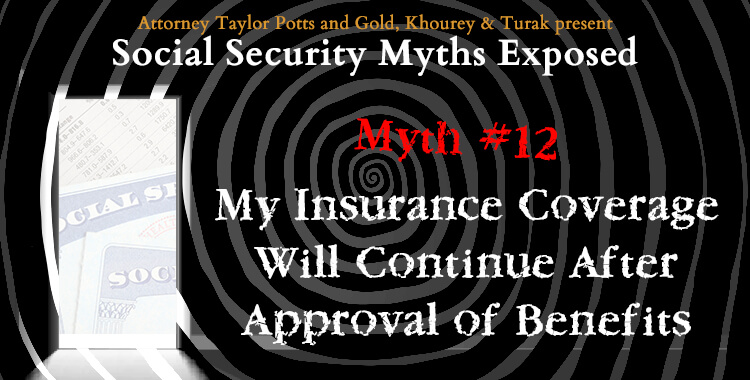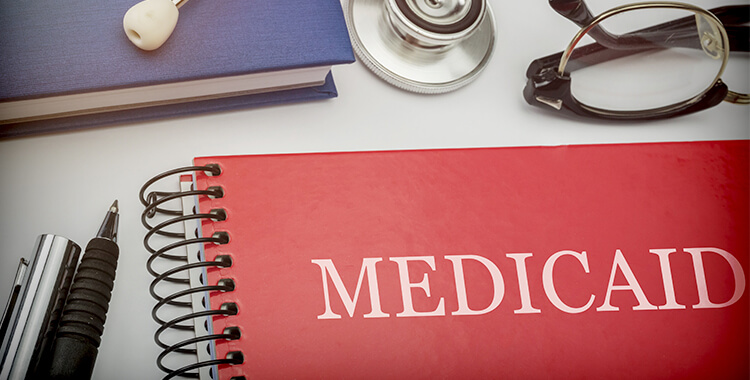
Every Tuesday, Social Security Attorney Taylor Potts will expose some of the more frequent myths surrounding Social Security Benefits. Be sure to “like” our Facebook page and stop back each week as Attorney Potts takes you through The Twilight Zone – Social Security Style. If you have questions about Social Security Disability or VA Disability benefits, contact Attorney Taylor Potts at (304) 845-9750.
Welcome to the final installment of my blog series about some of the more common misunderstandings, or myths, about Social Security Benefits Disability Insurance and Supplemental Security Income.
Over the past several months, we have covered a number of topics including, the initial application, how age may impact benefits, when to file for Social Security benefits, and what kind of benefits are available to you; along with how much will you receive in benefits and when you should start receiving benefits. I appreciate you going with me on this journey through The Twilight Zone – Social Security Style, and I hope you have learned something along the way.
As always, if you have any questions about Social Security Disability Insurance, Supplemental Security Income, or any other Social Security benefit do not hesitate to contact me at (304) 845-9750.
For a complete listing of blogs in this series, please click here.
TYPES OF INSURANCE
Some of the biggest concerns expressed by claimants, and often mentioned late, are concerns over health insurance coverages once benefits are awarded. When an individual comes to me for help with their benefits, many times the prospect and their family are receiving little to no income due to their disability and inability to work. Therefore, oftentimes my clients are on Medicaid health insurance through their respective state of residence. This coverage fills an important gap when you are unable to work to obtain insurance through an employer and cannot afford a private insurance policy. However, since Medicaid is needs based, what happens when a Social Security recipient begins receiving monthly payments?

Unfortunately, many Social Security claimants incorrectly assume they will simply continue to receive Medicaid benefits, get Medicare, or some form of insurance coverage through Social Security. However, this may not be the case. There are a few different ways insurance benefits can continue after an individual is approved for Social Security Disability benefits. If continued healthcare benefits are of importance to you, and you do not have access to a private insurance plan, you should discuss your insurance needs and concerns with your representative, the Social Security Administration, and your attorney at the onset of your claim. Don’t wait.
THE HARD TRUTH!
First, let’s get the hard truth out of the way. You should understand that there are some instances in which you may qualify for Social Security Disability benefits but not be eligible for a form of insurance other than a private plan, at least initially. This occurs when you do not meet the special criteria for either Medicare or Medicaid. Therefore, you would have little choice but to obtain a private health insurance policy from the market and pay for it yourself. These private plans can be very costly, and could potentially take most of the disability benefits award you receive. The good news is that most people do qualify for Medicare or Medicaid, even with Social Security Disability benefits. If a claimant is required to obtain private insurance, under most circumstances, this may only be needed in the short term.
EARLY MEDICARE ELIGIBILITY?
Traditionally, individuals are not eligible to receive Medicare health insurance until they are at least 65 years of age. However, if a person is receiving Social Security Disability benefits, it’s possible the recipient could be eligible to receive Medicare health insurance before turning 65. In order for a Social Security Disability recipient to be eligible for early Medicare benefits, the individual is required to have been disabled for 24 consecutive months prior to seeking coverage through Medicare. This 24-month period begins from the disability onset date that is determined by the Social Security Administration under Social Security’s rules.

For example, let’s assume an individual under the age of 65 has been disabled and unable to work since January 2017, but did not apply for benefits until 2020. If the claimant is ultimately approved from their alleged date of January 2017, they would immediately be eligible for early Medicare since it has been more than 24 months since Social Security determined their disability onset date. However, if the claimant applied for and obtained disability benefits within six (6) months of their disability onset (again January 2017) they would be required to wait out the remainder of the 24-month period (18 months) before early Medicare coverage would be available.
Before we move on, I want to provide a quick reminder of a few things. This blog is a very general reference in regards to Medicare coverage. Under Medicare, there are many different “parts” or types of coverage. For example, Part A coverage is only regarding hospital stay coverage, while Part B is more traditional medical insurance. Furthermore, Part D covers prescriptions. All of these Parts have different requirements but, for the purposes of this post, we have not broken them out. In addition, please know that once you become eligible for Medicare you will be required to pay a monthly premium for the coverage. While significantly less expensive than a private plan, it is still important to note there will be a cost associated with Medicare health insurance coverage.
BUT WHAT ABOUT MY MEDICAID?
As I noted above, many people that apply for Social Security Disability benefits are receiving Medicaid insurance because of the position their disability has put them in financially. However, when you are approved for Social Security Disability benefits, your position can drastically change. You will begin receiving monthly award payments and you may even receive a large sum of back pay. Remember, Medicaid insurance coverage is a needs based program. Meaning, Medicaid will review your income and assets to determine if you are eligible to receive or continue to receive Medicaid insurance coverage.
Each state has different levels of allowed income, assets, etc. which can be seen here. If you fall within the income/asset guidelines for your state, regardless of your disability benefits payments, you will either remain or be eligible for Medicaid coverage. If you do not meet the requirements, then the fact you are receiving disability benefits will not change your eligibility. The only exception are those individuals who are receiving Supplemental Security Income (SSI) benefits. In some states, regardless of other factors, if a person is eligible and receiving SSI benefits then that person is also eligible to receive Medicaid insurance coverage. However, each state is different in its requirements, applications, process, and how they extend coverage. Not every state treats SSI eligibility as Medicaid eligibility.
GKT Local Social Security Disability Lawyer
I admit, this is a lot of information to digest and the process can be frustrating. Unfortunately, many people try to juggle their day-to-day problems, understand their medical conditions, and apply for disability insurance by themselves. Oftentimes, the concerns over continued health insurance coverage once benefits are obtained are overlooked or ignored. However, not having insurance coverage or being forced to pay market prices for a private plan may leave people in a position not much different than before they obtained benefits.

You are not alone, and you shouldn’t have to go through this process alone. Gold, Khourey & Turak is a local law firm that has the experience and knowledge to help preserve insurance coverage for those looking to obtain disability benefits. From understanding the Social Security claims process, to planning around what outcomes are most important to you, we can help you obtain the benefits you deserve. We offer free consultations, and there is never a fee until we obtain benefits for you. Contact our office today at (304) 845-9750.


